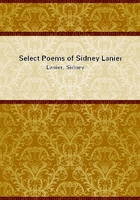
第58章 CHAP. XIX.(3)
Sec. 222. The reason why men enter into society, is the preservation of their property; and the end why they chuse and authorize a legislative, is, that there may be laws made, and rules set, as guards and fences to the properties of all the members of the society, to limit the power, and moderate the dominion, of every part and member of the society: for since it can never be supposed to be the will of the society, that the legislative should have a power to destroy that which every one designs to secure, by entering into society, and for which the people submitted themselves to legislators of their own making;whenever the legislators endeavour to take away, and destroy the property of the people, or to reduce them to slavery under arbitrary power, they put themselves into a state of war with the people, who are thereupon absolved from any farther obedience, and are left to the common refuge, which God hath provided for all men, against force and violence. Whensoever therefore the legislative shall transgress this fundamental rule of society;and either by ambition, fear, folly or corruption, endeavour to grasp themselves, or put into the hands of any other, an absolute power over the lives, liberties, and estates of the people; by this breach of trust they forfeit the power the people had put into their hands for quite contrary ends, and it devolves to the people, who. have a right to resume their original liberty, and, by the establishment of a new legislative, (such as they shall think fit) provide for their own safety and security, which is the end for which they are in society. What I have said here, concerning the legislative in general, holds true also concerning the supreme executor, who having a double trust put in him, both to have a part in the legislative, and the supreme execution of the law, acts against both, when he goes about to set up his own arbitrary will as the law of the society. He acts also contrary to his trust, when he either employs the force, treasure, and offices of the society, to corrupt the representatives, and gain them to his purposes; or openly preengages the electors, and prescribes to their choice, such, whom he has, by sollicitations, threats, promises, or otherwise, won to his designs; and employs them to bring in such, who have promised before-hand what to vote, and what to enact. Thus to regulate candidates and electors, and new-model the ways of election, what is it but to cut up the government by the roots, and poison the very fountain of public security? for the people having reserved to themselves the choice of their representatives, as the fence to their properties, could do it for no other end, but that they might always be freely chosen, and so chosen, freely act, and advise, as the necessity of the common-wealth, and the public good should, upon examination, and mature debate, be judged to require. This, those who give their votes before they hear the debate, and have weighed the reasons on all sides, are not capable of doing. To prepare such an assembly as this, and endeavour to set up the declared abettors of his own will, for the true representatives of the people, and the law-makers of the society, is certainly as great a breach of trust, and as perfect a declaration of a design to subvert the government, as is possible to be met with. To which, if one shall add rewards and punishments visibly employed to the same end, and all the arts of perverted law made use of, to take off and destroy all that stand in the way of such a design, and will not comply and consent to betray the liberties of their country, it will be past doubt what is doing. What power they ought to have in the society, who thus employ it contrary to the trust went along with it in its first institution, is easy to determine; and one cannot but see, that he, who has once attempted any such thing as this, cannot any longer be trusted.
Sec. 223. To this perhaps it will be said, that the people being ignorant, and always discontented, to lay the foundation of government in the unsteady opinion and uncertain humour of the people, is to expose it to certain ruin; and no government will be able long to subsist, if the people may set up a new legislative, whenever they take offence at the old one. To this I answer, Quite the contrary. People are not so easily got out of their old forms, as some are apt to suggest. They are hardly to be prevailed with to amend the acknowledged faults in the frame they have been accustomed to. And if there be any original defects, or adventitious ones introduced by time, or corruption; it is not an easy thing to get them changed, even when all the world sees there is an opportunity for it. This slowness and aversion in the people to quit their old constitutions, has, in the many revolutions which have been seen in this kingdom, in this and former ages, still kept us to, or, after some interval of fruitless attempts, still brought us back again to our old legislative of king, lords and commons: and whatever provocations have made the crown be taken from some of our princes heads, they never carried the people so far as to place it in another line.